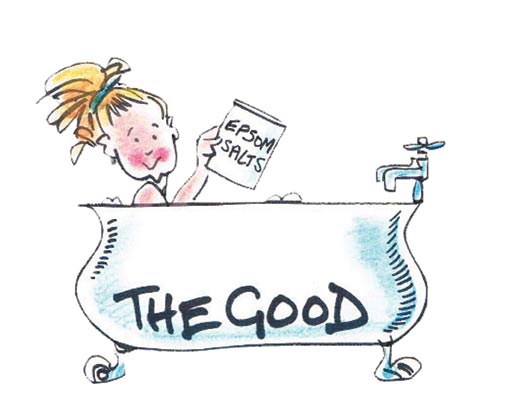|
|
Sulphates and Sulphites – the Good, the Moderately Bad and the Ugly |
| Margaret Moss elucidates |
Sulphur dioxide (E220), sodium sulphite (E221), sodium bisulphite (E222), sodium metabisulphite (E223), potassium metabisulphite (E224), calcium sulphite (E226) and calcium bisulphite (E227) are preservatives that cause symptoms in susceptible people, and particularly in some asthmatics. They can cause wheezing, fainting and irritation of the digestive system. It has been calculated that Western people consume 1–3mg of sulphite a day, if they do not drink wine or beer, and even more if they do. Sulphites are used in medical products, like some inhalers and Epi-pens. It keeps the gut wall healthy, so that too large fragments of food cannot pass through. If they did, it would lead to the production of antibodies, and to allergy. It detoxifies chemicals in foods and drugs, chemicals made by the body and others from the environment. This protects us from cancer. If we lived in the Garden of Eden, we might make enough sulphate. However, we do not make enough for life in our industrialised society. Some people are particularly bad at making it, and they tend to have chronic illnesses. Major genetic abnormalities in this enzyme lead to severe damage to the nervous system and eyes in children. The enzyme needs enough molybdenum and vitamin B2, which is also called riboflavin. Deficiency can be detected by a cheap urine test, or else these nutrients can be taken for a trial period. Buckwheat is not a grain at all, and can be eaten by some people who are grain sensitive. It is rather solid if boiled alone, but you can boil it with white rice to make it lighter. Then add some coconut oil or butter, leek or onion, and tomato or pepper, spread it on a buttered flat tray, and bake it to make a savoury flapjack. Alternatively you can try a Russian recipe. Boil the buckwheat with twice as much water, until the water has been absorbed. Then take off your coat! Put it on the table, cover it with paper, put the pan on the paper, wrap the coat round the pan, and leave it for an hour. I have published clinical research showing that it can improve general health and reduce aches and pains. There are plenty of vitamin B2 supplements. The main thing is to ensure that you do not take a supplement including boron, a mineral that is toxic, because it causes vitamin B2 to be excreted. Meat, fish and eggs are good for most people, but if you lack rhodenase, you are better off without them, because they contain a lot of sulphur amino acids. It is a pity that people have their colons removed, because no one has suggested they try a meat, fish and egg-free diet. If you do try this diet, it is a good idea to take some fish oil, and if you like the taste of meat, you can always use meat fat in your cooking. Epsom salt baths are important for people with ulcerative colitis. They deliver sulphate to the gut wall via the bloodstream. What is to be avoided is sulphate delivered via the contents of the gut. In the past, sulphite was something we made in our bodies, but it was only one of the steps towards producing the sulphate we needed. Now many people consume sulphite from various foods and drinks, and their capacity to process it is inadequate. As with any allergy or intolerance, it is not enough to reduce your exposure. You also need to make yourself less susceptible. Nutrition is a powerful tool, but it needs to be targeted carefully at a particular problem. You can find Margaret at the Nutrition and Allergy Clinic in Stockport, UK First published in 2009
|













